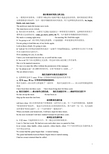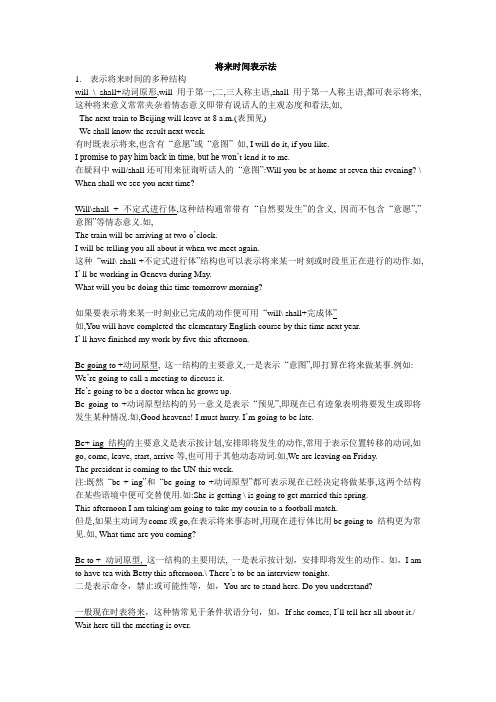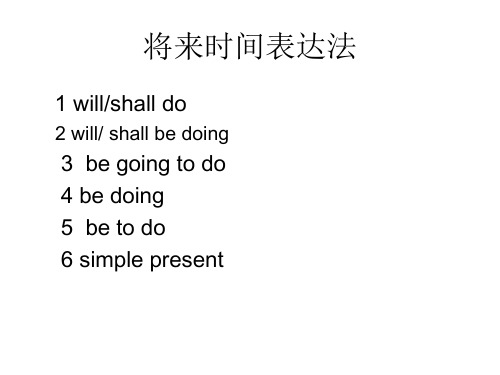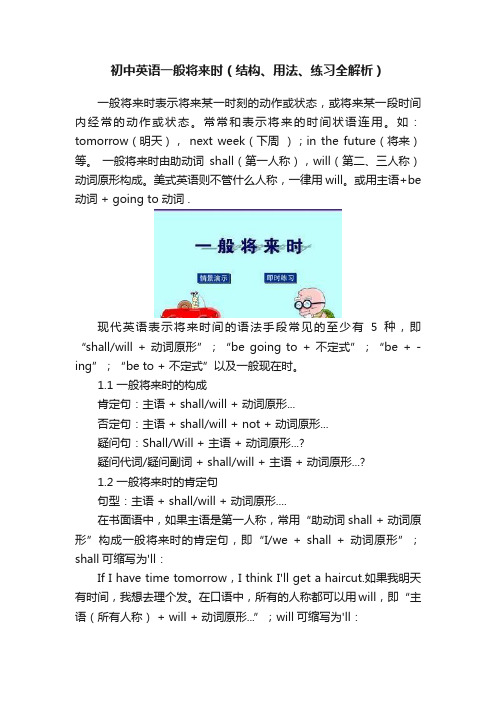lk英语语法点练习9-时态4:将来时间表示法
表示将来时间的几种方法

表示将来时间的几种方法:1.一般现在时表将来,主要用于确定的计划或不随主观意志而改变的,按时刻表或日程表安排将要进行的动作。
句中一般有明确的将来时间状语。
用于这种情况的动词有:be, begin, finish, end, start, learnThe professor starts his lecture next week.The train leaves at six o'clock.2. 现在进行时表将来,主要用于近期计划或表示一种即将发生的情形。
这种情形常常用于那些表示运动的动词:come, go, leave, arrive, fly等。
句中通常有明确的将来时间状语。
My uncle is coming right away. I'm meeting Mr. Drell this night.3. “be going to do"表示事先考虑过的意图,计划或根据一些客观事实所作的预见。
I'm not going to lend him any of my books again.Look at these clouds. It's going to rain.4. "will do"表示对事态发展的预见或在一定条件下的意图或意志;这种情形可以用于行有条件从句或时间从句的句中。
I'll fo anything for you, if you like.Unless you work hard from now on, or you'll fail the exam.5. "be to do"用于表示近期的正式安排,传达命令指示或分配工作任务等。
She is to be married tomorrow.No one is to enter the office without the permission of the manager.6. " be about to do" 表示瞬时将来时间,以为“顷刻或马上就要……"The are about to leave.现在完成时与现在完成进行时1. 这两种时态在与since 和for 引导的时间状语连用时有所不同A. 在与since 和for 引导的时间状语连词时:现在完成时---表示动作已经延续了一段时间现在完成进行时——表示动作将要延伸到将来I have been here for three years. I have been living here for three years.B. 现在完成时——表示动作已经完成。
将来时间表示法

表示一般将来时间的结构
will/shall + do
意图;预见
will/shall+be doing
纯将来;将来进行
Will/shall+have done
将来完成
will/shall + do VSbe going to do
will/shall + do:当事人认为会发生,临时想到的‘意图’;
be going to do:有迹象标明会发生,事先考虑过的‘意图’
be going to do VSbe doing
be going to do:已考虑过的意图,主观的、随时可以改变;
be doing:肯定的安排,不容改变,甚至不顾当事人的意图
be to do
官方消息(报纸、新闻),命令、禁止、可能性;用于正式语体
过去将来完成
was/were doing
与be doing类似
was/were going to do
与be going to do类似;没有实现的意图
was/were to do
表示过去将来的安排,不可避免要发生的事情;安排未执行则用was/were to have done
was/were about to
present tense
用于条件、时间状语分句;按既定日程一定会发生
be about to
‘即将’,通常不用表示将来的时间状语
表示过去将来时间的结构
would do
Байду номын сангаас用于从属分句
would be doing
过去进行;过去将来与will/shall + be doing相同
would have done
表示将来的时态(一般现在时表将来,现进表将来以及一般将来时)

我相信,中国将会变成世界上最富有的国家之一。
There is going to be a heavy rain.
将会பைடு நூலகம்一场大雨。
②be going to和will均可表示“意图”:事先考虑过的意图用be going to;不是 事先考虑的意图即临时决定的用will。 I’m going to Qingdao this weekend. 这个周末我要去青岛。 —Sorry,I forgot to buy the book you need. ——对不起,我忘了去买你要的书了。 —It doesn’t matter. I will go myself. ——没关系。我自己去买就行了。
一般现在时
在时间和条件状语从句中可用一般现在时代替
一般将来时。 I’ll let you know as soon as I hear from him. 我一接到他的信就告诉你。
现在进行时
有些动词,如come, go, leave, return, arrive,
begin, start等,它们的现在进行时可表示不远 的将来要发生的事情。例如: Flight 1095 is landing soon. 第1095号航班马上要着陆了。
(
(
)5. Look! Some visitors __ for the bus over there. (2015南宁) A. are waiting B. is waiting C. waiting D. Wait
( (
) 6. ---What were you doing at 5:30 yesterday afternoon? --- I ______ with Sam.(2016 钦州) A. walk B. walks C. was walking D. walked )7. — What are you going to do tomorrow?(2014 柳州) — I ______ visit my aunt. A. went to B .go to C. am going to
将来时间表示法

将来时间表示法1.表示将来时间的多种结构will \ shall+动词原形,will 用于第一,二,三人称主语,shall 用于第一人称主语,都可表示将来,这种将来意义常常夹杂着情态意义即带有说话人的主观态度和看法,如,The next train to Beijing will leave at 8 a.m.(表预见)We shall know the result next week.有时既表示将来,也含有“意愿”或“意图”如, I will do it, if you like.I promise to pay him back in time, but he won’t lend it to me.在疑问中will/shall还可用来征询听话人的“意图”:Will you be at home at seven this evening? \ When shall we see you next time?Will\shall + 不定式进行体,这种结构通常带有“自然要发生”的含义, 因而不包含“意愿”,”意图”等情态意义.如,The train will be arriving at two o’clock.I will be telling you all about it when we meet again.这种“will\ shall +不定式进行体”结构也可以表示将来某一时刻或时段里正在进行的动作.如, I’ ll be working in Geneva during May.What will you be doing this time tomorrow morning?如果要表示将来某一时刻业已完成的动作便可用“will\ shall+完成体”如,You will have completed the elementary English course by this time next year.I’ ll have finished my work by five this afternoon.Be going to +动词原型, 这一结构的主要意义,一是表示“意图”,即打算在将来做某事.例如: We’re going to call a meeting to discuss it.He’s going to be a doctor when he grows up.Be going to +动词原型结构的另一意义是表示“预见”,即现在已有迹象表明将要发生或即将发生某种情况.如,Good heavens! I must hurry. I’m going to be late.Be+-ing结构的主要意义是表示按计划,安排即将发生的动作,常用于表示位置转移的动词,如go, come, leave, start, arrive等,也可用于其他动态动词.如,We are leaving on Friday.The president is coming to the UN this week.注:既然“be +-ing”和“be going to +动词原型”都可表示现在已经决定将做某事,这两个结构在某些语境中便可交替使用.如:She is getting \ is going to get married this spring.This afternoon I am taking\am going to take my cousin to a football match.但是,如果主动词为come或go,在表示将来事态时,用现在进行体比用be going to 结构更为常见.如, What time are you coming?Be to + 动词原型, 这一结构的主要用法, 一是表示按计划,安排即将发生的动作。
将来时的常见表达法

JU□山东朱秀兰一般将来时表示将来要发生的动作或存在的状态,即表示将来时间。
常见的将来时间状语有:tomorrow,the day after tomorrow,tomorrow morning/ afternoon/evening;in2014,in two days;next week/Sunday/month/term/year;this Monday/week/month/year;in a minute/moment;at once;today;in the future, soon,some day,one day;before long等。
1.M be going to+动词原形”。
be要根据主语人称和数的需要转换为is,am或are o此结构表示将要发生的事情或打算、计划、决定在最近或将来要做的事;也可以表示主观意愿,即表示事先经过考虑之后做出的计划或安排。
例如:Miss Li is going to be a doctor in the future.李小姐将来想当医生。
They have bought some cloth,they are going to make themselves coats.他彳f]买了些布料,准备自己做外套。
I'm going to leave for Canada next year.我计划明年去加拿大。
He's going to reach America in a few hours.几个小时后他将到达美国。
“be going to+动词原形”表示根据已有的迹象判断要发生的某种事态。
这种场合往往不需要有时间状语与之连用。
例如:Be careful!You are going to run into the tree.小心!你快要撞到树上了。
Look at the dark clouds.It is going to rain.看这乌云,像是要下雨了。
将来时间表达法

1)表说话人的“预见” e.g.: You will feel better after taking this medicine. We shall know the result next week. 2) 表主语的“意愿”或“意图” e.g.: I will do it, if you like. As the railway is not yet open to traffic, we shall go by boat. I promise to pay him back in time, but he won’t lend it to me.
5. Be to do
1) 表按计划或决定。 e.g.: The Queen is to visit Japan next year. The Prime Minister is to speak on television tonight.
3. Be going to do
1) 通常表句子主语的“意图”,即打算在将 来作某事。有时该意图不是句子主语的。 e.g.: Are you going to post that letter by air mail? How long is he going o stay here? He’s not going to cheat me again(=I won’t let him cheat me again. The wall is going to be painted green(=We or sb. Else intend to paint the wall green)
2) 表命令、禁止或可能性。 e.g.: You are to stand here. Do you understand? The dictionary is not to be had here. * 表按计划、安排将要发生的时态时,既可用 be doing, 也可用be to do, 后者较常用于正 式语体。
初中英语一般将来时(结构、用法、练习全解析)

初中英语一般将来时(结构、用法、练习全解析)一般将来时表示将来某一时刻的动作或状态,或将来某一段时间内经常的动作或状态。
常常和表示将来的时间状语连用。
如:tomorrow(明天),next week(下周);in the future(将来)等。
一般将来时由助动词shall(第一人称),will(第二、三人称)动词原形构成。
美式英语则不管什么人称,一律用will。
或用主语+be 动词 + going to 动词 .现代英语表示将来时间的语法手段常见的至少有5种,即“shall/will + 动词原形”;“be going to + 不定式”;“be + -ing”;“be to + 不定式”以及一般现在时。
1.1 一般将来时的构成肯定句:主语 + shall/will + 动词原形...否定句:主语 + shall/will + not + 动词原形...疑问句:Shall/Will + 主语 + 动词原形...?疑问代词/疑问副词 + shall/will + 主语 + 动词原形...?1.2 一般将来时的肯定句句型:主语 + shall/will + 动词原形....在书面语中,如果主语是第一人称,常用“助动词shall + 动词原形”构成一般将来时的肯定句,即“I/we + shall + 动词原形”;shall可缩写为'll:If I have time tomorrow,I think I'll get a haircut.如果我明天有时间,我想去理个发。
在口语中,所有的人称都可以用will,即“主语(所有人称) + will + 动词原形...”;will可缩写为'll:Some day,I'll tell you.将来某一天我会告诉你的。
1.3 一般将来时的否定句句型:主语 + will/shall + not + 动词原形...一般将来时的否定句是在will/shall后加not;will not可缩写为won't;shall not可缩写为shan't:Mary won't go to the party.玛丽不会去参加晚会。
将来时的六种表示法

一般将来时的六种表示法一、will/shallwill/shall通常用来表示将来时间。
Will用于第一、二、三人称主语,shall用于第一人称主语,都可以表示将来时,但是这种意义通常夹杂着情态意义,即带有说话人的主观态度和看法,比如表示“预见”:You will feel better if you after taking this medicine.He won’t be here in time unless he comes by air.We shall know the result next week.I am sure that I shall not lose my way in the woods.有时候表示将来,也含有“意愿”或“意图”I will do it if you like it.As the railway is not yet open to traffic, we shall go by boat.I promised to pay him back in time, but he won’t lend it to me.二、be going to这一结构的主要意义,一是表示“意图”,即打算在将来做什么。
Are you going to post that letter by air mail?How long is he going to stay here? 由于没有语境的限制,也可以换成will。
We’re going to call a meeting to discuss it.意图的体现者通常是句子的主语,但也有可能不是。
如:He’s not going to cheat me again.(=I won’t let him cheat me again.)二是表示“预见”,即现在已有的迹象表明将要或即将发生某种情况。
如:I feel dizzy. I think I am going to faint.Good heavens! I must hurry. I’m going to be late.Look at that black clouds——there is going to be a storm.表“意图”的用法有时候可以与“will+do”互换使用,但是也要注意区分。
- 1、下载文档前请自行甄别文档内容的完整性,平台不提供额外的编辑、内容补充、找答案等附加服务。
- 2、"仅部分预览"的文档,不可在线预览部分如存在完整性等问题,可反馈申请退款(可完整预览的文档不适用该条件!)。
- 3、如文档侵犯您的权益,请联系客服反馈,我们会尽快为您处理(人工客服工作时间:9:00-18:30)。
Means of expressing future time将来时间表示法一、将来时间表示法1. 情态助动词Modal auxiliary –will/shall :Will/shall do通常用来表示表示将来时间,常常带有情态色彩,即说话人的主观态度和看法可表示预测,预见(Prediction), 意图(Intention), 意愿(Willingness), eg:1) A: Waiter, will my pizza be long? B: No, I expect it will be round as usual.2) Two fish were swimming together in a river.“Look,” said the first one. “It’s starting to rain.”“Quick. Let’s swim under the bridge,” said the second fish, “or we’ll get wet.”3) You will feel better after taking this medicine.4) I will do it, if you like.5) What shall I do with your mail? (征询听话人的意图)will/shall be -ing表示自然要发生(不包含意图和意愿*intention, *willingness)1) The train will be arriving at two o’clock.2) You can use my bike. I won’t be needing it tomorrow.表示将来某个时间动作正在进行, eg:1) I’ll be working in America during May.2) What will you be doing this time tomorrow morning?比较Will do & will be doing (同为表预测时prediction)Will do: 常常带有说话人的主观态度和看法& Will be doing: 表示自然要发生will/shall have done: 在将来某个点上某个动作已完成或刚刚完成1) I’ll have finished my work by five this afternoon.2) Before long he will have forgotten all about it.Will/shall have been –ing某个动作在将来某个点之前已经持续了一段时间,而且还可能继续下去1) By the end of this month I will have been working here for 20 years exactly.2) If it rains again tomorrow, then it will have been raining for a whole week.Will be doing/ will have done/ will have been doing在一定语境下并不表示将来而仅指说话者的猜测,如:1) It’s already six o’clock. He won’t be working now.2) He will have received my letter by now.3) You’ll have been wondering all this time how my invention works.2. Semi-auxiliary半助动词a. Be going to do1)打算在将来做某事A: I am going to buy one of those small Japanese radios. B: But how will you understand what they are saying?How long is he going to stay here?He’s going to be a doctor when he grows up.2)Feeling of certainty (prediction) 表预测、预见时表示已有迹象表明要发生或即将发生某种情况Eg: (Look at the watch) I must be hurry. I’m going to be late.I feel dizzy. I think I’m going to faint.Look at these black clouds – there’s going to be a storm.✧比较Will do & be going to doPrediction表预测、预见时Will: 说话者认为、相信某事要发生Be going to: 有迹象表明某事要发生Intention表意图时Be going to: 有事先经过考虑过Will: 临时想到的1) A. Why are you taking down all the pictures? B: I’m going to repaper the room.2) A: What a terribly heavy box! B: I’ll help you to carry it.b. Be to do:表示按计划、安排即将发生的动作,如:1) I am to have tea with Betty this afternoon.常见于报纸和广播,用于宣布官方计划或决定,如:The Queen is to visit Australia next year.表命令,禁止等,如:You are to stand here. Do you understand? Tell her she’s not to be late again.表注定:Everyone is to die.3. Present progressive (be doing)现在进行时: 表按计划、安排即将发生的动作,常用表示位置转移的动词,如go, come, leave, start, arrive等,也可用于其他动态动词We’re leaving on Friday.The plane is taking off at 5:20.We’re moving to a different hotel the day after tomorrow.✧比较be doing & be to do两者都有确定计划,后者更加正式,且可以表示命令、禁止等;✧比较be doing & be going to doBe doing 有计划和安排& be going to do只不过考虑了一下,并无确定的计划4. Simple present一般现在时常见于条件句和时间分句中(more frequent than in main clauses):If she comes, I’ll tell her about it.I’ll give it to you after I return.在主句中用一般现在时表示将来时间通常指按照时间表或既定日程一定会发生的将来事态: She retires next month.Tomorrow is Friday.The train leaves at 7:30 this evening.✧比较Simple present & be doing一般现在时表将来:更加正式(more formal), 更加客观(more objective), 具有不可更改性(unalterable)1. Modal auxiliary情态助动词:Would do (will do 的过去式)2. Semi-auxiliary半助动词a. Was/were going to do 通常带有表示过去将来时间的状语He was going to play tennis that afternoon.He said he was going to stay in London for a while.可以表示没有实现的意图, eg: Last Sunday we were going to go for a picnic but it rained.b. Was/were to 通常指按过去的计划、安排将在某个过去将来时间发生的事态,如:As I was to leave the next day, I went to bed early on Thursday evening.如果表示过去的安排,如果这个安排后来被取消了,没有实现,则用“was/were to + have -ed”. 比较: We were to have left at six but it rained.This construction can also be used in the sense of “was destined to”, denoting a past destiny:They said goodbye, little knowing they were never to meet again.c. Was/were about to 通常指最近的过去将来事态(Express the immediate future in the past)I felt that something terrible was about to happen.在一定语境中指未曾实现的意图(an unfulfilled intention): We were about to start when it began to rain.3. 过去进行时/一般过去时过去进行体表示过去将来:通常指按过去的计划、安排即将在某一过去时间发生的事态(past schedule, arrangement), eg:He said they were leaving in a few weeks.一般过去时表示过去将来: 通常用于某些条件状语和时间状语分句, eg:He said he would tell her all about it if/when he met her.。
